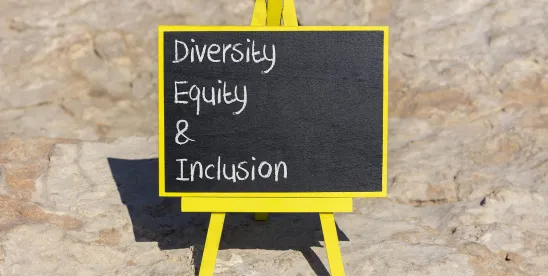Big Picture
On February 21, 2025, a federal judge in the District Court of Maryland granted a temporary injunction blocking portions of President Trump’s Executive Orders “Ending Illegal Discrimination and Restoring Merit Based Opportunity” (“14173”) and “Ending Radical and Wasteful Government DEI Programs” (“14151”) (collectively the “EOs”). To learn more about each EO’s directives read Blank Rome’s previous coverage on 14173 here and 14151 here. This is a temporary nationwide ban on certain portions of the EOs.
After pointing out that the Trump Administration has declared “DEI to be henceforth illegal”, the Court found the EOs do not “define any of the operative terms” such as “illegal DEI”, “equity-related”, “promoting DEI”, or “illegal discrimination or preferences”. This vagueness fails to provide companies and organizations with proper notice as to what types of programs are prohibited. Further, the Court found that the EOs likely violate the First Amendment by expressly threatening “the expression of views supportive of equity, diversity and inclusion.” This is a nationwide ban.
Background: EOs Have Government Contract Implications & Implicate the Private Sector
Among other provisions, EO 14173 requires that all federal contracts and/or grant awards contain a term where the contractor/grantee must agree its “compliance in all respects with all applicable Federal anti-discrimination laws” is material to the government’s payment decisions for purposes of the False Claims Act (“FCA”) (the “Certification Provision”).
EO 14173 also applies pressure to the private sector, directing the Attorney General (“AG”), in consultation with heads of federal agencies, to prepare a report by May 20, 2025, containing strategies on how to encourage the private sector to end “illegal discrimination” by, among other things, creating a “plan of specific steps or measures to deter DEI programs or principles” including the identification of “up to nine potential civil compliance investigations of publicly traded corporations, large non-profit corporations or associations, foundations with assets of 500 million dollars or more, State and local bar and medical associations, and institutions of higher education with endowments over 1 billion dollars” (the “Enforcement Threat Provision”).
Additionally, relevant to the Court’s decision, EO 14151 directs federal agencies to “within sixty days of this order … terminate, to the maximum extent allowed by law, all … ‘equity-related’ grants or contracts” (the “Termination Provision”).
Basis for the Legal Challenge: DEI Advocates Challenge EOs
On February 3, 2025, various diversity, equity, and inclusion (“DEI”) advocates moved to preliminarily enjoin the enforcement of both EOs on, among other grounds, the following:
- Violation of the Fifth Amendment, arguing the EOs are unconstitutionally vague as they do not define key terms such as what “illegal” DEI or “equity-related” is thereby not providing proper notice to employers; and
- Violation of the First Amendment, arguing the threat of civil compliance investigations and new government contractor certifications chill ability to freely discuss important DEI-related topics.
Court Enjoins Enforcement of Termination & Certification Provisions for Government Contractors
After conducting a hearing on February 19, 2025, the Court partially agreed with Plaintiffs and preliminarily enjoined the Administration from enforcing portions of the EOs, specifically halting the following actions as it relates to government contractors:
- Terminating any awards, contracts, or obligations on the basis of being “equity-related” under the Termination Provision;
- Requiring any grantee or contractor to make any “certification” or other representation pursuant to the Certification Provision; and
- Bringing any FCA enforcement action, including but not limited to any enforcement action premised on any “certification” made pursuant to the Certification Provision.
Court Enjoins Enforcement Through Civil Compliance Investigations for Private Sector
As it relates to the private sector, the President’s administration is blocked from bringing any enforcement action pursuant to the Enforcement Threat Provision. Importantly, the Court specified that although enforcement is blocked, the AG may continue to prepare their report including “[a] plan of specific steps or measures to deter DEI programs or principles. . .that constitute illegal discrimination or preferences.”
Notably the Court’s decision does not block similar provisions in EO 14173 directing the AG to include additional information in their report, namely, “key sectors of concern within each agency’s jurisdiction”; “litigation that would be potentially appropriate for federal lawsuits, intervention, or statements of interest”; and the “most egregious and discriminatory DEI practitioners in each sector of concern.”
Next Steps for Employers
While this is an early win for proponents of DEI initiatives, government enforcement plans have not been blocked and new lawsuits are being filed against companies challenging their DEI programs daily. Most recently, the state of Missouri filed suit against multinational chain of coffeehouses for their “illegal DEI” practices (including minority-based mentorship programs and diversity goals) and the state of Florida filed a class action lawsuit against a large retail corporation alleging the company misled investors about the risks related to their LGBTQ Pride campaign.
Government contractors, organizations receiving federal funding, and private sector employers may have a slight temporary reprieve but should consult with their legal counsel now regarding steps to take in light of the Court’s decision, as this decision is likely to be appealed by the administration. Further, it is important to understand the AG’s ability to continue preparing their report encouraging the private sector to end DEI initiatives and enforcement through means outside of the Enforcement Threat Provision currently being fair game.
If not done so already, all companies should conduct a privileged assessment of current DEI statements, policies, and initiatives to ensure compliance with federal laws. All employers should remain diligent in their review given that the Court’s decision is a temporary pause on enforcement and this outcome, along with the outcomes of additional pending lawsuits filed, and those sure to be filed, are developing.




 />i
/>i

